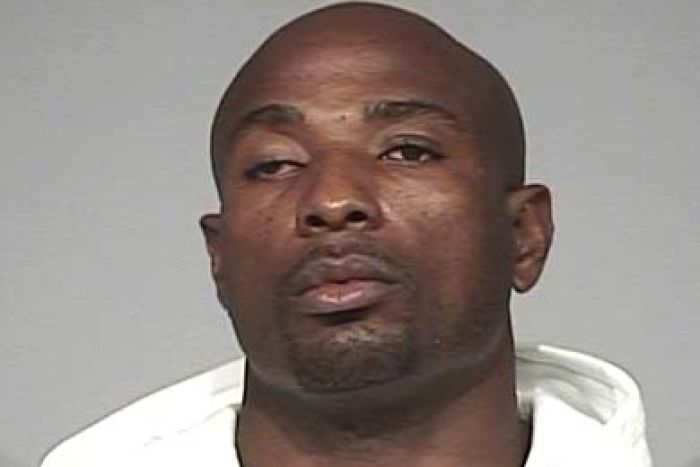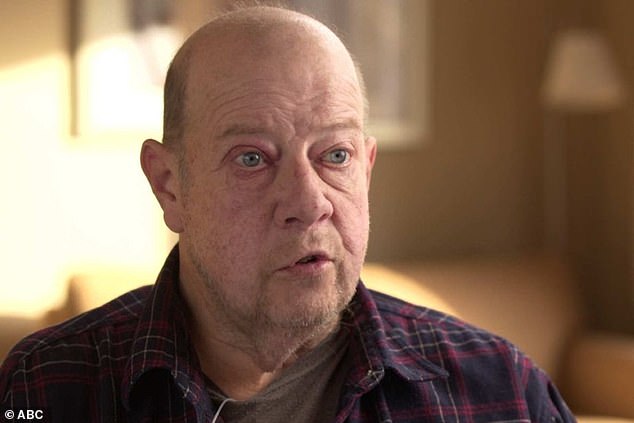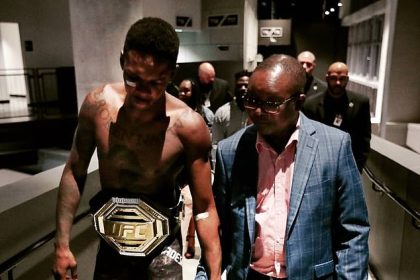

HEARTLESS!
Nigeria’s Convicted Drug importer in Australia, PATRICK NWEKE inside Sydney’s Villawood Detention centre smuggled several mobile phones to dupe an American disability pensioner $US400,000…creates Fake Romance scheme, later tricked Peter Strand into Trafficking drugs to evade customs
*Coordinate operatives in Europe, South America, Africa, Asia and Australia to lure Strand to Sydney airport with 2.5 kilograms of cocaine
* Suspect criminal network target the elderly and vulnerable to become couriers
* Strand lost his job as an electrical salesman, his marriage crumbled
* “I received an email from a scammer posing as a Nigerian Government official offering to help retrieve funds. It was extremely well organised. That’s mind-boggling, absolutely mind-boggling and let alone out of Australia, but out of a detention facility — how is that possible?”-Victim
* “They would coordinate their travel arrangements, they would put them up in hotels, they would provide them with money, aeroplane tickets and then upon receipt, they would take acceptance of the drugs and introduce them into the market. Mr Strand as a prize catch because he was broke, sick and frail. The people controlling the man are in Spain”-Australian Police
BY TINA IBIDUN/SPECIAL CORRESPONDENT, SYDNEY & GEORGE ELIJAH OTUMU/AMERICAN FOREIGN BUREAU CHIEF
HE’S REGARDED ONE OF THE WORLD GLOBAL DRUG CZARS. HE IS A NIGERIAN BORN MAN, PATRICK NWEKE earlier convicted for drug importation in Australia. He was charged for crimes again recently having found that as at the time he was held inside Sydney’s Villawood Detention, he had smuggled in 10 mobile phones to deceive an innocent American, Peter Strand to the tune of $400,000 after he created a fake romance scheme and deceitfully coerce him along the way as a mule into conveying a 2.5 kilograms of cocaine for their criminal network.
Phone taps recorded inside Sydney’s Villawood Immigration Detention Centre have uncovered the inner workings of a global fraud and drug trafficking network that used a serial scam victim to smuggle drugs into Australia. The phone intercepts, obtained by Four Corners, reveal how Nigerian detainee and convicted drug importer Nweke directed and financed the operation using an American disability pensioner, who he had never met, as a drug mule.
Nweke, 44, was recorded by the NSW Crime Commission and NSW Police as he used smuggled phones to coordinate with operatives in Europe, South America, Africa, Asia and Australia to lure Peter Strand, 65, to Sydney airport with 2.5 kilograms of cocaine.
A Four Corners investigation found Nweke’s syndicate was part of a worldwide network of crime organisations that originated in Nigeria and are now making billions of dollars a year from online fraud, drug smuggling and money laundering. The crime groups have spread into Australia, where NSW Police allege they have continued to operate inside the Villawood detention centre.
For the records, in a separate case last October, police arrested a second Nigerian detainee who allegedly used 16 contraband phones inside Villawood to run a syndicate that allegedly defrauded Australian romance scam victims and businesses of nearly $3 million.
Romance scam victims like Mr Strand are at the heart of the network’s ruthless business — conned out of their savings and often exploited as mules to launder money and, in some cases, to transport drugs through death penalty countries.
“It was extremely well organised,” Mr Strand told Four Corners in the town of Fox River Grove, near Chicago, where he has returned after spending 18 months in a Sydney jail accused of importing cocaine. “That’s mind-boggling, absolutely mind-boggling and let alone out of Australia, but out of a detention facility — how is that possible? The New South Wales Crime Commission stumbled upon the operation to lure Mr Strand from the US when they heard Nweke on calls in 2013 to a Chinese-Australian money launderer who specialised in shifting vast sums of money offshore for Sydney drug syndicates.
Accordingly, from November 2013 to April 2014, the Commission and NSW Police tapped 10 mobile services Nweke used inside Villawood to secretly call Nigerian contacts in South Africa, Brazil, Nigeria, India and Australia. At the time, Nweke was fighting deportation from Australia over his previous conviction for importing cocaine.
Nweke bragged on the phone about his ability to bring in “birds” — stooges to smuggle drugs on planes. “I don’t put myself at the frontline,” he said. “I like to put other people there.”
He put out the call to his operatives to find a Westerner who would escape the attention of Australian Customs.
Mr Strand had lost his job as an electrical salesman, his marriage and later $US400,000 ($564,320) to a series of romance scams, when he received an email in November 2013 from a scammer posing as a Nigerian Government official offering to help retrieve the funds. Within days, the ailing diabetic was in constant contact via email and on the phone with the official who called himself “Bricks Manuel”.
“The intensity of the communications with Bricks at some point was almost every day, sometimes two or three times a day, sometimes in the middle of the night,” Mr Strand said.
“It was virtually around the clock.” After months of communication between Mr Strand and “Bricks”, Nweke received word from a contact in Nigeria that a potential courier in Chicago had been sourced by scammers in Europe. The people controlling the man are in Spain,” the operative told Nweke.
The operative, who called himself Kelvin, described Mr Strand as a prize catch because he was broke, sick and frail. “The man is the best,” Kelvin said. “He moves about with a built-in oxygen pipe — that is how he breathes, so no-one will even stop him. You will even pity him when you see him.” Another operative told Nweke “the guy is very good for what you need him for, his age is good, he has something in his heart that helps him breathe”.
Nweke bankrolled the high-risk operation and planned to distribute shares of the profits through his international network, which his calls revealed spread into Spain, Austria, the Philippines, China, Japan and Bangladesh.
“Does this man know what he is doing?” Nweke asked in another call.
“What he knows, he is doing chemicals,” Kelvin said.
“What they are told is that they are carrying chemicals used in producing money. That is what the marketers tell them.”
Mr Strand was told he was collecting chemicals to literally launder money, an outlandish scam used with surprising success by West African syndicates as one way to convince travellers to carry drugs.
“Supposedly this cash that I was going to be getting was marked with some type of dye, which needed to be cleaned off in order for me to get clean cash,” Mr Strand said.”The cash was in turn supposed to be for me, but I never got it.” Mr Strand was sent on three trips to South America. “There were people during the course of all these trips that would seem to come out of the woodwork,” Mr Strand said.
“There was a network of people who God knows how these people all fit together.”
Australian police were waiting for Mr Strand when he landed at Sydney airport on a flight from Brazil on April 29, 2014. Customs officers found 2.5 kilograms of pure cocaine mixed with other chemicals inside two protein powder containers in a bag he had brought from Brazil.
Mr Strand was among 44 drug mules arrested at Australian airports between 2013 and 2016 after being drawn in by criminal syndicates, many of them unwittingly, using online scams. Mr Strand’s barrister, David Barrow, represented several of them. “He wasn’t the only one who fell for it,” Mr Barrow said.
“He was identified as the type of gullible person who was vulnerable to this type of manipulation.
“It was tailor-made to meet the need to manipulate him and they had real insights into what made him tick. They were able to respond to him in ways that constantly reassured him … They knew how to mollify him, to reassure him, to manipulate his emotions.”
As Mr Barrow trawled through hundreds of emails between Mr Strand and his scammers, as well as five months of intercepted calls in and out of Villawood, the criminal lawyer and Crown prosecutor detected a criminal methodology he had never witnessed before.
“They seemed to be like a vertically integrated company,” Mr Barrow told Four Corners.
“They were able to source the drugs from particular places — in this case from Brazil but from places like China as well. “They had people on the ground there who obviously were able to transmit funds for the payment of the drugs, they were able to source gullible couriers like Mr Strand who were white, who were ‘respectable’, who weren’t going to be closely looked at as they travelled through international borders.
“They would coordinate their travel arrangements, they would put them up in hotels, they would provide them with money, aeroplane tickets and then upon receipt, they would take acceptance of the drugs and introduce them into the market, whichever country they got to.
“It was a well-tried and I think well-practised approach.”
Mr Strand was found not guilty of drug importation after a trial in the NSW District Court.
Nweke was convicted of drug importation last year and is due to be sentenced next month for his leadership role in a global crime network.



